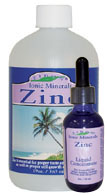

Eidon - Zinc Concentrate 2 oz
$19.99
Zinc
is essential for the maintenance of immune system strength and gland
health. It can be rapidly depleted when the body is fighting an
illness such as cold and flu. Zinc is the tenth most abundant element
in the human body. Zinc is found in all organs, tissues and cells,
and is involved in the function and activation of over 200 enzymes.
Enzymes are the unique essential proteins that make the human body
function properly.
Its vital role in maintaining proper immune system function and detoxification abilities has earned zinc its reputation as a cold and flu remedy. Zinc promotes immune system health by activating the production of white blood cells. These white blood cells form the basis of the immune system and destroy both damaged cells and invaders when antibodies recognize a specific antigen or foreign pathogen, such as a virus.
Zinc activates the production of numerous hormones necessary for growth and development. Like enzymes, hormones are proteins essential to the body's health. These proteins are produced in specific organs in the body, passed into the bloodstream and carried to distant cells and organs to stimulate numerous biological processes.
Zinc has been shown to play an integral role in combating stress, regulating appetite, useful in treating myopia (nearsightedness), and enhancing the senses of taste and smell. Most people suffering from alcoholism are found to be deficient in zinc. In addition, zinc protects the liver from damage. Alcohol is one of the most prevalent causes of liver malfunction, causing cirrhosis and fatty liver. Zinc has actually been shown to help reverse cirrhosis. Arsenic, cadmium, and lead are a few of the toxic elements that zinc helps to eliminate from the body. Inflammatory bowel disease, parasites and other intestinal problems can damage the intestines. Studies have shown that zinc is essential for intestinal wound healing. Consequently, zinc should be considered as a good supplement for gastrointestinal problems from heartburn to Crohn's disease.
Its vital role in maintaining proper immune system function and detoxification abilities has earned zinc its reputation as a cold and flu remedy. Zinc promotes immune system health by activating the production of white blood cells. These white blood cells form the basis of the immune system and destroy both damaged cells and invaders when antibodies recognize a specific antigen or foreign pathogen, such as a virus.
Zinc activates the production of numerous hormones necessary for growth and development. Like enzymes, hormones are proteins essential to the body's health. These proteins are produced in specific organs in the body, passed into the bloodstream and carried to distant cells and organs to stimulate numerous biological processes.
Zinc has been shown to play an integral role in combating stress, regulating appetite, useful in treating myopia (nearsightedness), and enhancing the senses of taste and smell. Most people suffering from alcoholism are found to be deficient in zinc. In addition, zinc protects the liver from damage. Alcohol is one of the most prevalent causes of liver malfunction, causing cirrhosis and fatty liver. Zinc has actually been shown to help reverse cirrhosis. Arsenic, cadmium, and lead are a few of the toxic elements that zinc helps to eliminate from the body. Inflammatory bowel disease, parasites and other intestinal problems can damage the intestines. Studies have shown that zinc is essential for intestinal wound healing. Consequently, zinc should be considered as a good supplement for gastrointestinal problems from heartburn to Crohn's disease.